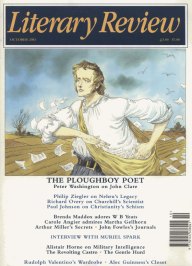Geordie Greig
Grandees Under Fire
Beneath A Waning Moon: Diaries, 1985-1987
By James Lees-Mile
John Murray 272pp £22.50
A GOOD DIARIST constructs a series of information time bombs, set to detonate long after the events he describes have taken place. And, in a gentle sort of way, that is just what James Lees-Milne has done. There are no smoking guns to bring down a government but there will definitely be a few intakes of breath in certain grandees' drawing rooms. Princess Michael of Kent, for instance, would never have expected her blunt declaration that the English are the stupidest nation in Europe to be given an airing more than fifteen years after she uttered it. Nor would any of the Duke of Beaufort's children expect to be labelled a philistine or, in the case of the Duke's daughter-in-law, a downright loony. Lees-Milne's diaries are filled with endless little barbs and expressions of bitterness like these which act as social hand grenades, not exactly Exocets of investigative journalism but certainly enough to keep the reader hooked. David Frost is berated as a second-rate man whose speech at a Foyle's lunch almost made Lees~Milne, an intolerant old queen at the best of times, want to cry with boredom. Lindy Dufferin, he opines, has a mouth like that of Madame Cyn, the Streatham brothel keeper. And so it goes on, although with the occasional nugget of praise: Mick Jagger has beautiful hands (his music is too violent though); Jamie Ferguson, the Obits editor of the Independent and a cousin of Lees-Milne's, is 'clever and civilised', but then comes the barb – the rest of the diarist's family are mostly ' utter barbarians and bore me stiff'. Ouch! But then that is what the reader wants. Published diaries must be full of malice, mischief and mad moments of indiscretion. Lees-Milne delivers on all counts, even when the subject is himself. He writes about his rather weird platonic love affair with Michael Bloch, his literary executor and the editor of these diaries, and about the guilt-ridden intimacies of his marriage.
What distinguishes this diary is the cast. There is a good cross-section of people who had (and in some cases continue to have) a particular social significance. There are no politicians, no captains of industry; this is the land of nobs - just as we would expect from a National

Sign Up to our newsletter
Receive free articles, highlights from the archive, news, details of prizes, and much more.@Lit_Review
Follow Literary Review on Twitter
Twitter Feed
How to ruin a film - a short guide by @TWHodgkinson:
Thomas W Hodgkinson - There Was No Sorcerer
Thomas W Hodgkinson: There Was No Sorcerer - Box Office Poison: Hollywood’s Story in a Century of Flops by Tim Robey
literaryreview.co.uk
How to ruin a film - a short guide by @TWHodgkinson:
Thomas W Hodgkinson - There Was No Sorcerer
Thomas W Hodgkinson: There Was No Sorcerer - Box Office Poison: Hollywood’s Story in a Century of Flops by Tim Robey
literaryreview.co.uk
Give the gift that lasts all year with a subscription to Literary Review. Save up to 35% on the cover price when you visit us at https://literaryreview.co.uk/subscribe and enter the code 'XMAS24'